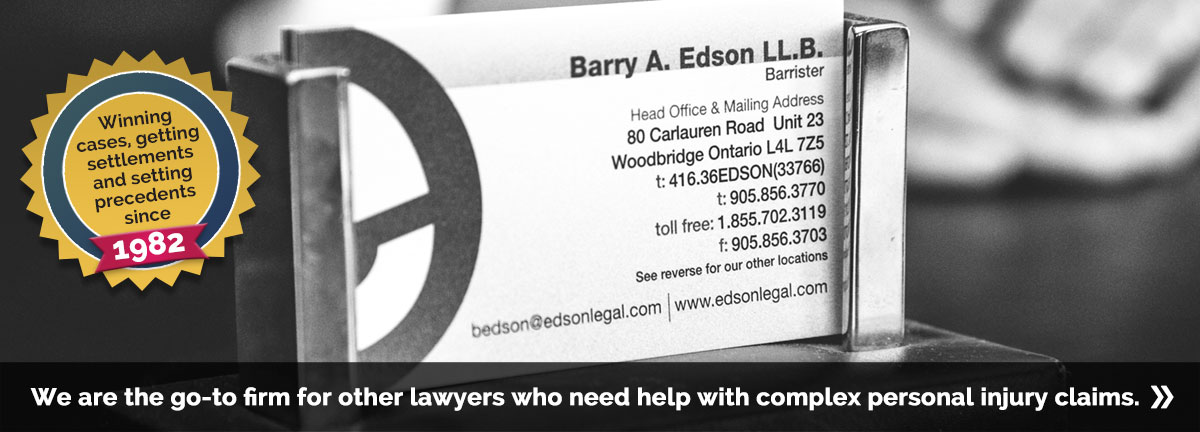Pastore v Aviva Canada Inc (2012) is the latest in a trilogy of cases by the Ontario Court of Appeal relating to the important definition of catastrophic impairment. The court ruled that only one marked or extreme functional impairment due to a mental or behavioral disorder is necessary to qualify accident victims for enhanced catastrophic impairment benefits. While personal injury lawyers and those affected both mentally and physically by their injuries applauded the decision, insurers have perceived it as an overall loss in their attempt to raise the ‘catastrophic impairment’ threshold.
Facts
The appellant Ana Pastore (Pastore), was hit by a car while crossing the street in 2002. Her injury was a fractured left ankle that gave rise to complications and surgeries over the span of five years due to not healing properly. In addition to the ankle surgeries, her knee had to be replaced when ankle pain led to a change in her gait. The injury to her ankle had a great impact on Pastore’s life. Prior to the accident, Pastore was described as an active and self-sufficient matriarch, who was the primary caregiver to her husband of 38 years who was undergoing chemo-dialysis at the time. The accident significantly reduced her mobility, and she was no longer able to do housekeeping or participate in recreational activities. She became almost completely dependent on others for her basic personal care needs. In May 2005, Pastore filed an application with her insurer Aviva Canada Inc. (Aviva) to have her injuries designated as causing a “catastrophic impairment”, which allowed her to qualify for significantly enhanced Statutory Benefits Act Schedule – Accidents on or after November 1, 1996, O. Reg. 403/96 (SABS) benefits.
Pastore was assessed for catastrophic impairment at a Designated Assessment Centre (DAC) by a team that included a physiatrist, a psychologist, a psychiatrist, and an occupational therapist. The assessment by the DAC was carried out by reference to the American Medical Association’s Guide to the Evaluation of Permanent Impairment (the Guides) that set out a three-stage test for evaluation of catastrophic impairment based on mental disorder using four categories of functional limitation and five levels of dysfunction. The first stage is a diagnosis of any mental disorders, followed by a second stage where the impact on daily life is identified. The final stage assesses the extent of the limitations by looking at four categories and determining their levels of impairment. Proving most relevant in this case was the court’s focus on limitations regarding activities of daily living; social functioning; concentration, persistence and pace; and deterioration or decompensating in work or work-like settings.
The four categories are then each assessed based on the following levels of impairment: Class 1 – no impairment; Class 2: mild impairment which is to say that “any discerned impairment is compatible with most useful functioning”; Class 3: moderate impairment, which “means that the identified impairments are compatible with some, but not all useful functioning”; Class 4: market impairment, which is “level of impairment that significantly impedes useful functioning”; lastly Class 5: extreme impairment, which “preclude(s) useful functioning”. Relying the required five-level scale, the DAC came to the conclusion that Pastore had a catastrophic impairment consisting of a marked impairment in her daily activities due to mental or behavioral disorder under s.2(1.1)(g) (currently section s.3(2)(f)). With relation to the other three points, she qualified as having only moderate impairment in that she had some, but not all, useful functioning. However, as later contested by Aviva, the DAC found that one marked impairment was enough to qualify Pastore as having suffered a catastrophic impairment.
Findings
Disagreeing with the DAC findings, the parties engaged in an arbitration process under s.282 of the Insurance Act. Aviva put forward two issues to the Financial Services Commission of Ontario (FSCO) delegate: (i) does the then s.2(1.1) (g) of SABS require an overall assessment of marked impairment in all four categories of functional limitation in the Guides, or can marked impairment in one category result in a finding of catastrophic impairment; and (ii) was it an error for the DAC assessors to include physical pain in the assessment of mental disorder in order to comply with the American Medical Association’s Guides to the Evaluation of Permanent Impairment?
The FSCO delegate’s decision that was overturned by Ontario Divisional Court and then reinstated by the Court of Appeal was found to be reasonable given the facts. With regards to the first issue, her conclusion that the word “a” in s.2(1.1)(g) of the SABS could be interpreted in its ordinary meaning as per Oxford Dictionary. This meant that the section required only a single function from the Guides to be at the marked impairment (class 4) level in order to qualify as catastrophic impairment, a decision the Court of Appeal agreed was certainly within the range of possible, acceptable interpretations of the statute.
This finding was contrary to Aviva’s argument that DAC guidelines required overall class 4 impairment for claimant to qualify as catastrophically impaired. The Court of Appeal did admit to the Guides being fairly ambiguous in terms of how many functions need to be impaired in order to be seen as catastrophic but chose to show deference to the delegate in her interpretation of the agency’s governing statute. On the second point, Aviva contended that the daily pain Pastore experienced was a result of the physical injuries to her ankle and knee and as such should not be included as “due to” her mental disorder. The delegate reviewed evidence from doctors found Pastore had Adjustment Disorder with Depressed Mood and was indeed a significant factor in her chronic pain issues. Once again, the delegate referred to the Oxford Dictionary meaning of “due to” which included “because of, owing to” to form her interpretation, one falling within the reasonable range according to the Court of Appeal. Pastore’s final mental disorder diagnosis was “Pain Disorder Associated with Psychological Factors and General Medical Condition”. Since the mental disorder did involve pain along with pain associated with general medical condition, it was surely reasonable to include pain from the general medical condition to the extent that such pain was connected with a diagnosed mental disorder
Analysis
As Brian Cameron, Intervener and Counsel for the Ontario Lawyers Association had stated, the decision “should not have taken five hearings over several years to determine that ‘a’ means one” as the FSCO arbitrator had so clearly reasoned. It is hard to imagine on any reasonable interpretation of the word “a” that it could mean overall or more than one. The Pastore decision is illustrative of the extent that insurance companies are willing to go through in order to prevent access to the accident benefits system that were designed for people who require health care needs in order to regain some stability in their lives. To suggest that impairment in one aspect of a victims life is not enough for a successful application is troubling. For example, a person with marked impairment within the Guides definition of daily activities is one whose behavioral impairments significantly impede most useful functioning such as cleaning, shopping, cooking, riding the bus, grooming, paying bills or using the telephone to name a few.
If Aviva’s argument had succeeded this would mean that not only must a person face significant impediment with routine activities noted above, but they must also face impediment in social functioning, concentration, persistence and pace or decompensating in work or work-like setting. This means that a person must not only be unable to ride the bus or use the phone, but they must also experience other impediments within the class 4 to 5 designations in order to have a successful application. It is difficult to conceive of a word other than ‘catastrophic’ to describe impediments that limit a person’s ability to do things that people perform on a daily basis without thought – to demand impediments of all aspects of life would be beyond all reason. As such, the Pastore case can prove to be a powerful tool when it comes to standing up to insurance companies and receiving benefits for physical and mental impairments arising from injury. If you feel that you are not receiving the benefits, let the experts at Edson Legal provide you with the help that you deserve.




